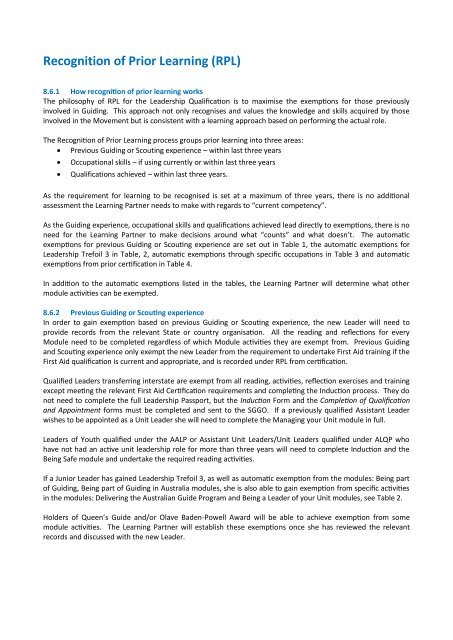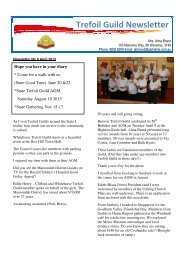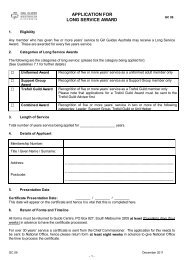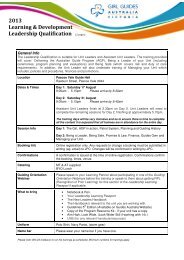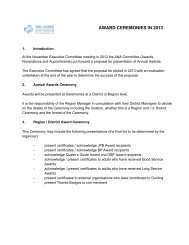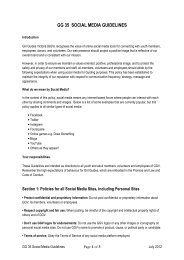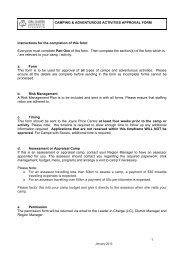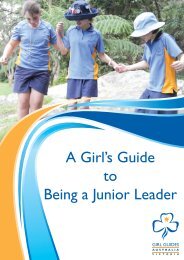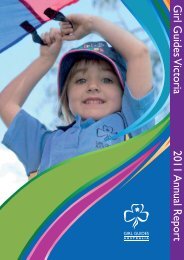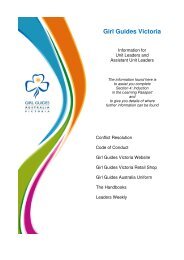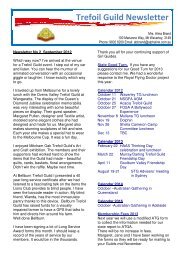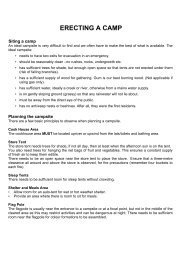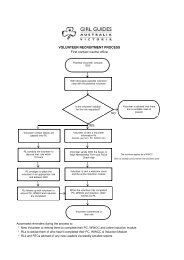Recognition of Prior Learning Statement
Recognition of Prior Learning Statement
Recognition of Prior Learning Statement
Create successful ePaper yourself
Turn your PDF publications into a flip-book with our unique Google optimized e-Paper software.
<strong>Recognition</strong> <strong>of</strong> <strong>Prior</strong> <strong>Learning</strong> (RPL)<br />
8.6.1 How recognition <strong>of</strong> prior learning works<br />
The philosophy <strong>of</strong> RPL for the Leadership Qualification is to maximise the exemptions for those previously<br />
involved in Guiding. This approach not only recognises and values the knowledge and skills acquired by those<br />
involved in the Movement but is consistent with a learning approach based on performing the actual role.<br />
The <strong>Recognition</strong> <strong>of</strong> <strong>Prior</strong> <strong>Learning</strong> process groups prior learning into three areas:<br />
Previous Guiding or Scouting experience – within last three years<br />
<br />
<br />
Occupational skills – if using currently or within last three years<br />
Qualifications achieved – within last three years.<br />
As the requirement for learning to be recognised is set at a maximum <strong>of</strong> three years, there is no additional<br />
assessment the <strong>Learning</strong> Partner needs to make with regards to “current competency”.<br />
As the Guiding experience, occupational skills and qualifications achieved lead directly to exemptions, there is no<br />
need for the <strong>Learning</strong> Partner to make decisions around what “counts” and what doesn’t. The automatic<br />
exemptions for previous Guiding or Scouting experience are set out in Table 1, the automatic exemptions for<br />
Leadership Trefoil 3 in Table, 2, automatic exemptions through specific occupations in Table 3 and automatic<br />
exemptions from prior certification in Table 4.<br />
In addition to the automatic exemptions listed in the tables, the <strong>Learning</strong> Partner will determine what other<br />
module activities can be exempted.<br />
8.6.2 Previous Guiding or Scouting experience<br />
In order to gain exemption based on previous Guiding or Scouting experience, the new Leader will need to<br />
provide records from the relevant State or country organisation. All the reading and reflections for every<br />
Module need to be completed regardless <strong>of</strong> which Module activities they are exempt from. Previous Guiding<br />
and Scouting experience only exempt the new Leader from the requirement to undertake First Aid training if the<br />
First Aid qualification is current and appropriate, and is recorded under RPL from certification.<br />
Qualified Leaders transferring interstate are exempt from all reading, activities, reflection exercises and training<br />
except meeting the relevant First Aid Certification requirements and completing the Induction process. They do<br />
not need to complete the full Leadership Passport, but the Induction Form and the Completion <strong>of</strong> Qualification<br />
and Appointment forms must be completed and sent to the SGGO. If a previously qualified Assistant Leader<br />
wishes to be appointed as a Unit Leader she will need to complete the Managing your Unit module in full.<br />
Leaders <strong>of</strong> Youth qualified under the AALP or Assistant Unit Leaders/Unit Leaders qualified under ALQP who<br />
have not had an active unit leadership role for more than three years will need to complete Induction and the<br />
Being Safe module and undertake the required reading activities.<br />
If a Junior Leader has gained Leadership Trefoil 3, as well as automatic exemption from the modules: Being part<br />
<strong>of</strong> Guiding, Being part <strong>of</strong> Guiding in Australia modules, she is also able to gain exemption from specific activities<br />
in the modules: Delivering the Australian Guide Program and Being a Leader <strong>of</strong> your Unit modules, see Table 2.<br />
Holders <strong>of</strong> Queen’s Guide and/or Olave Baden-Powell Award will be able to achieve exemption from some<br />
module activities. The <strong>Learning</strong> Partner will establish these exemptions once she has reviewed the relevant<br />
records and discussed with the new Leader.
Table 1: Automatic Exemptions from Module Activities and Training due to previous Guiding or Scouting<br />
experience<br />
Previous Role<br />
Youth Members<br />
New Leaders who have been youth<br />
members for at least one year <strong>of</strong><br />
the previous three years.<br />
Overseas Leaders<br />
Leaders who were qualified Guide /<br />
Girl Scout Leaders in another<br />
country.<br />
Scout Leaders<br />
Leaders who are qualified<br />
Australian Scout Leaders.<br />
Leaders from other Australian<br />
States<br />
Leaders who gained their<br />
Leadership Qualification in a<br />
different Australian state.<br />
Exemptions from Module Activities<br />
(Reading and reflections<br />
must still be completed)<br />
Being part <strong>of</strong> Guiding<br />
Being part <strong>of</strong> Guiding<br />
Being a Leader <strong>of</strong> your Unit<br />
Being a Leader <strong>of</strong> your Unit<br />
Exempt from all module activities, reading<br />
and reflections as already a qualified Leader.<br />
But, will need to meet State or Territory<br />
regulations as part <strong>of</strong> the Induction process.<br />
Exemptions from Guide<br />
Training<br />
Guiding Orientation<br />
Webinar<br />
Guiding Orientation<br />
Webinar<br />
Leadership<br />
Qualification Training<br />
Table 2: Automatic Exemptions due to achievement <strong>of</strong> Leadership Trefoil 3<br />
Leadership Trefoil 3 and/or<br />
Leadership Focus<br />
Exemptions from Module Activities<br />
(Reading and reflections<br />
must still be completed)<br />
Exemptions from<br />
Guide Training<br />
Being part <strong>of</strong> Guiding Full exemption Full exemption<br />
Being part <strong>of</strong> Guiding in Australia Full exemption Full exemption<br />
Delivering the AGP Exemption from activities: 2,3,5, 6,7,11,12 NO exemption<br />
Being a Leader <strong>of</strong> your Unit Exemption from activities: 2-6 NO exemption<br />
Being Safe NO exemption NO exemption<br />
Managing your Unit NO exemption NO exemption
Teacher /<br />
Outdoor Ed<br />
Teacher<br />
Youth Leader<br />
other org.<br />
Child Care<br />
Worker<br />
Teacher<br />
Assistant<br />
Qual Outdoor<br />
Activity<br />
Instructor<br />
Local Sports<br />
Coach<br />
Counsellor e.g.<br />
Social Worker<br />
Religious<br />
Leader<br />
Nurse, Doctor,<br />
Ambulance<br />
Worker<br />
Business<br />
Manager<br />
Accountant<br />
8.6.3 Occupational skills<br />
The Module activities that new Leaders can gain exemption from based solely on occupation are limited because<br />
all the activities are very much Guiding-centric. No automatic exemptions due to occupation apply to the<br />
following module activities: Being part <strong>of</strong> Guiding, Being part <strong>of</strong> Guiding in Australia, Delivering the AGP and<br />
Being Safe.<br />
The table below provides an example <strong>of</strong> the activities which some <strong>of</strong> the more common occupations provide<br />
exemption from. However, the occupation list is not exhaustive and thus the <strong>Learning</strong> Partner needs to use their<br />
common sense to make a decision about exemption. If a new Leader has an occupational background which is<br />
not listed, but would seem to provide a case for exemption, the <strong>Learning</strong> Partner should contact the State RPL<br />
Adviser for clarification.<br />
In addition, some occupations provide exemption from the requirement to achieve a First Aid qualification as<br />
follows:<br />
Emergency doctor or nurse<br />
<br />
<br />
Ambulance worker or paramedic<br />
General Practitioners with current vocational registration.<br />
Table 3: Example exemptions due to occupation / pr<strong>of</strong>essional experience<br />
Module Activity<br />
(other activities may be exempt<br />
depending on occupation)<br />
Being a Leader <strong>of</strong> your Unit<br />
3. Welcome parents or visitors<br />
to the Unit.<br />
<br />
Managing your Unit<br />
5. Keep financial records.<br />
6. Budget for an event/camp.<br />
9. Keep a record <strong>of</strong> programs<br />
and activities, correspondence<br />
and minutes <strong>of</strong> the Unit
8.6.4 Previous qualifications<br />
There is limited recognition <strong>of</strong> learning based on previous qualifications. Once any relevant certificates have<br />
been checked, the date and provider should be recorded in the <strong>Learning</strong> Plan and a copy or scan <strong>of</strong> the<br />
certificate should be sent to the State Office. If in any doubt about equivalence, e.g. gained in another State or<br />
country, speak to the State RPL Adviser.<br />
Table 4 Automatic Exemptions due to commonly held qualifications<br />
Module Activity/First Aid Training<br />
Being Safe<br />
Provide Basic Emergency Life Support<br />
(PBELS).<br />
Level 1<br />
First Aid<br />
Qualification<br />
Level 2/Senior<br />
First Aid<br />
Qualification<br />
Basic Food<br />
Hygiene<br />
Qualification<br />
7. Use safe food handling procedures. <br />
<br />
<br />
Financial or<br />
Book-keeping<br />
Qualification<br />
Managing your Unit<br />
Provide Basic Emergency Life Support<br />
(PBELS)<br />
<br />
5. Keep financial records. <br />
6. Budget for an event/camp. <br />
<br />
The <strong>Recognition</strong> <strong>of</strong> <strong>Prior</strong> <strong>Learning</strong> should be summarised in the appropriate table in Section 3 <strong>of</strong> the <strong>Learning</strong><br />
Passport and the resultant exemptions recorded in the second table in Section 3 <strong>of</strong> the <strong>Learning</strong> Passport. The<br />
relevant activities in Section 5 can then be signed-<strong>of</strong>f.<br />
If the <strong>Learning</strong> Partner has any doubts about how to apply RPL, questions should be referred to the State (or Region)<br />
RPL Adviser.


